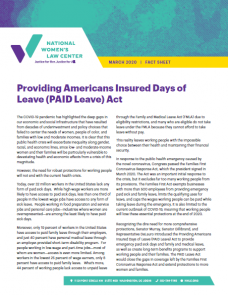Abortion rights, women of color, and LGBTQI+ people are under attack. Pledge to join us in fighting for gender justice.
 The COVID-19 pandemic has highlighted the deep gaps in our economic and social infrastructure that have resulted from decades of under investment and policy choices that failed to center the needs of women, people of color, and families with low and moderate incomes. It is clear that this public health crisis will exacerbate inequality along gender, racial, and economic lines, since low- and moderate-income women and their families will be particularly vulnerable to devastating health and economic effects from a crisis of this magnitude.
The COVID-19 pandemic has highlighted the deep gaps in our economic and social infrastructure that have resulted from decades of under investment and policy choices that failed to center the needs of women, people of color, and families with low and moderate incomes. It is clear that this public health crisis will exacerbate inequality along gender, racial, and economic lines, since low- and moderate-income women and their families will be particularly vulnerable to devastating health and economic effects from a crisis of this magnitude.
However, the need for robust protections for working people will not end with the current health crisis.
Today, over 32 million workers in the United States lack any form of paid sick days. While high-wage workers are more likely to have access to paid sick days, less than one third of people in the lowest-wage jobs have access to any form of sick leave. People working in food preparation and service jobs and personal care jobs—industries where women are over represented—are among the least likely to have paid sick days.

